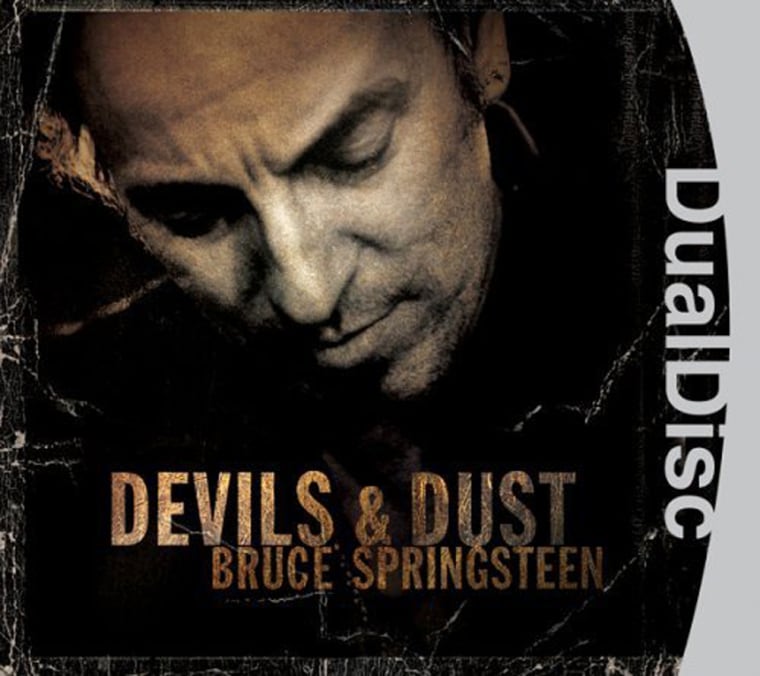The year was 1992 and Bruce Springsteen was feeling pretty good. He had overcome a messy divorce, relocated to sunny California, remarried, had a kid and knocked out not only one, but two new albums, his first releases in five years. One of the albums, “Lucky Town,” mainly dealt with the joy he found in family life. Coming off of the brutally revealing and dour, “Tunnel of Love” record, “Lucky Town” was a massive blast of optimism, a note to Bruce’s fans and the world that he was doing OK. However, the fans and critics did not go for it. Bruce would later joke about his attempt to write happy songs rather than those about conflict and despair: “I tried it in the early ‘90s and it didn’t work; the public didn’t like it.”
In 1995, Bruce would learn that there was a type of song that the public would like even less than his happy tunes: his small songs. That year he released, “The Ghost of Tom Joad,” an acoustic record that was filled with tiny tales of drug runners on the Mexican boarder, a closed down weapons factory in Ohio and a reckless romance that begins in a shoe store.
The album went on to win a Grammy for Best Contemporary Folk Album, but once again, the public balked (and they still do. At the time of writing this article, “Joad” is still the least popular Boss record on this MSNBC.com survey). Even in Bruce’s holy live setting, the performance of the songs from “Joad” drive fans into a fit of what Springsteen has labeled “selective listening,” a nice way to classify the mass exodus to the bathrooms or concession stands during his less popular songs.

Well “Joad” bashers, I may have some bad news for you. Many of the songs on Bruce’s new “Devils and Dust” collection were actually written during the “Joad” period, and even though some of the offerings have more dynamic arrangements (there is a band on the record, although they are not the E Streeters), there is still a handful that are cut from the same plainly spoken vignette mold as its 1995 predecessor. Songs like “Matamoros Banks,” “Silver Palomino,” and “Black Cowboys” are straight outta acoustic Joadville as they spin yarns about the poorest of the poor fighting for survival in southwestern America, a territory that is hardly explored in contemporary music but is of obvious interest to the Boss.
But it would be foolish to discount this record as “Joad II.” As with “The Ghost of Tom Joad,” this record is challenging (Bruce even provided crib note scene setter descriptions on two of the songs in the liner notes and a list of Spanish to English translations for a few of the words for two other tunes), and those willing to hunker down with this material will find treasures that are both familiar and entirely new.
The album kicks off with the title track, a politically charged powder keg that blurs the line between personal and political, soldier and voter. The opening lines of “I got my finger on the trigger; but I don’t know who to trust” may send Republicans running, but note that the rest of the album is far from being a Vote For Change endorsement. Instead, Bruce abandons the epic themes that have graced so many of his records for small psychological snap shots of Americans living American lives. “Reno,” for example, captures both the excitement and mechanics of an encounter with a prostitute. The song is racy enough to make “Deadwood” characters blush, but more importantly, it transports us to a place and mind set that is oft avoided by mainstream artists. Bob Dylan has been swimming in these waters on his most recent albums, and “Reno” even ends with a Dylanish croak.
On the electric offerings, producer Brenden O’Brien skillfully elevates some of the more simple songs to jaunty, modern Americana. The title track is laced with swirling keyboards and electronic beats, and “All the Way Home” and “Maria’s Bed” bounce with the same fun and energy that have filled many a John Hiatt and Nanci Griffith record. Another welcome surprise is Springsteen’s falsetto delivery on “All I’m Thinkin’ About.” Bruce can barely reach many of the notes, but he keeps in character and happily plows along. All our narrator needs here is his “blueberry wine” and thoughts of being with his lover. If it’s good enough for him, then it’s good enough for Bruce. Who needs to hit all those notes anyway?
A more traditional Boss story exists in “The Hitter.” Here we dwell in the isolating and heartbreaking existence of a boxer who is past his prime and who is carrying the baggage of past mistakes. The fighter here has lost a part of himself in the name of his trade, a theme that can be applied to Springsteen himself.
Also present on this album is one of them there “happy songs” that I mentioned earlier. “Long Time Comin’” has Bruce joyfully reporting that there are “two kids in a sleeping bag beside; I reach ‘neath your shirt, lay my hands across your belly; And feel another one kicking inside.” The song is clearly powered by the same jubilance that was heard on “Lucky Town.”
Who knows? The public may just like it this time.
Send your comments to Randy Abramson at .